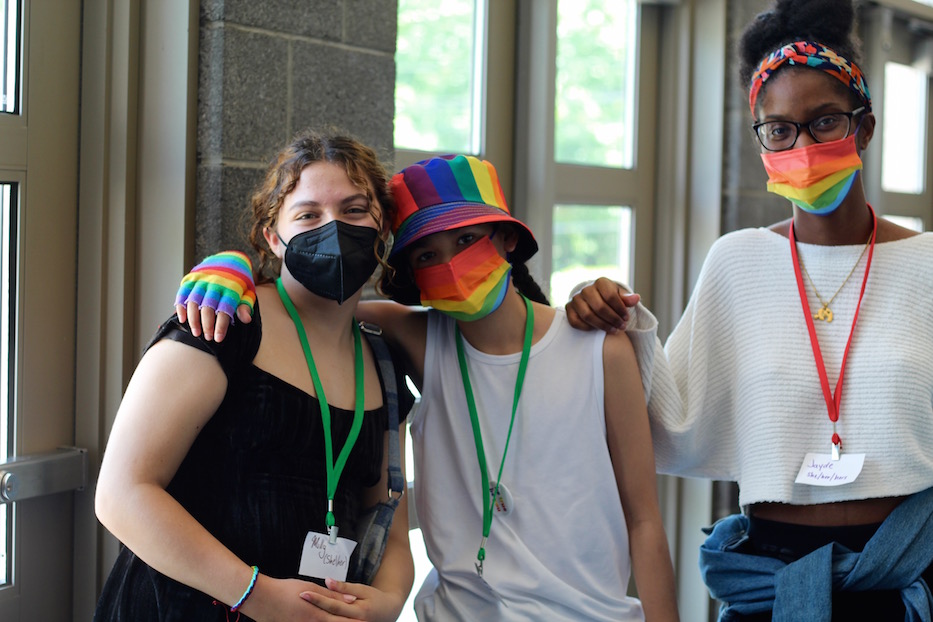
Culture & Community | Education & Youth | LGBTQ | Arts & Culture | New Haven Pride Center | Arts & Anti-racism
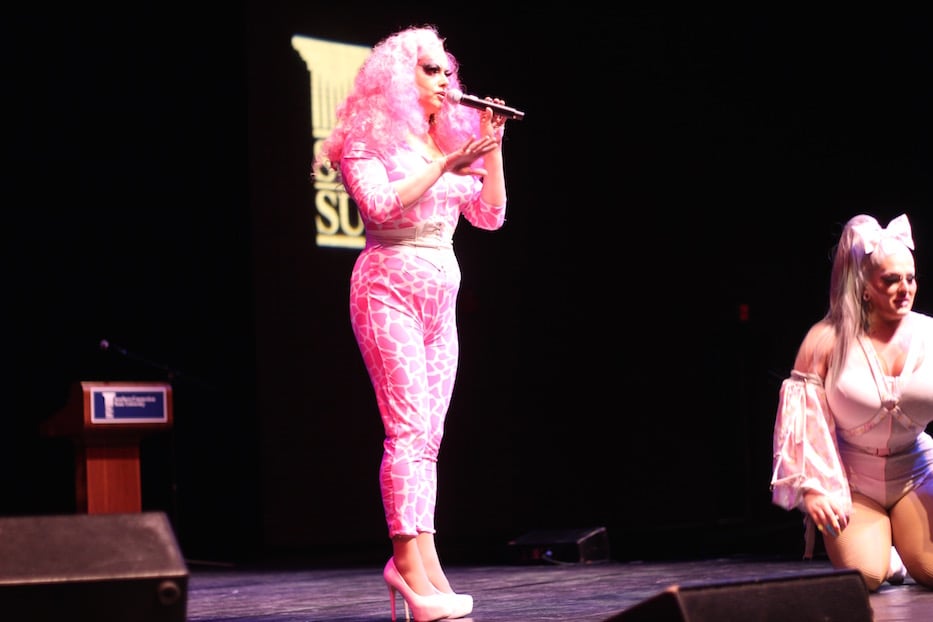
Kiki Lucia introducing Saturday afternoon's drag show. Lucia's male alter ego is the Pride Center's executive director, Patrick Dunn. Lucy Gellman Photos.
Kiki Lucia strutted to the front of the stage in a pink cheetah print bodysuit, her heels thumping as she walked. Her pink, wispy curls glowed neon in the auditorium’s light. In the audience, 100 pairs of eyes looked back at her, dancing as they traced her every move.
“How many of you know what chosen family is?” she asked. She smiled, her arched, painted cheekbones rising higher. A cheer erupted from the front rows.
The appearance came on the second day of the Connecticut LGBTQ+ Youth Conference, a new initiative from the New Haven Pride Center held at Southern Connecticut State University on May 20 and 21. After months of planning, the conference unfolded at SCSU’s Lyman Center with two full days of workshops, drag shows, keynote presentations, and queer networking. Its inaugural theme was “Artivism.” Four hundred young people attended.
It takes the place of True Colors’ long-running spring conference at the University of Connecticut, which folded when the organization shut down abruptly last year. In the wake of that closure, the Pride Center scrambled to bring advocates, peer leaders, educators, and artist-activists together to serve hundreds of young people. It received support from Health Care Advocates International and Connecticut’s LGBTQ+ Health and Human Services Network in February, just before it was announced at the 19th annual Dorothy Awards.
Producer Jahnice Cajigas, a longtime organizer with Citywide Youth Coalition (CWYC), praised curators Max Gamboa, Jamila Washigton and Jaeana Bethea—all queer youth with lived experience—and team members Lizamishel Boateng and Johan Castillo for helping make it a reality. Last Friday and Saturday, it appeared that every member of the center’s staff was somewhere inside SCSU, buzzing between workshops in an effort to help.
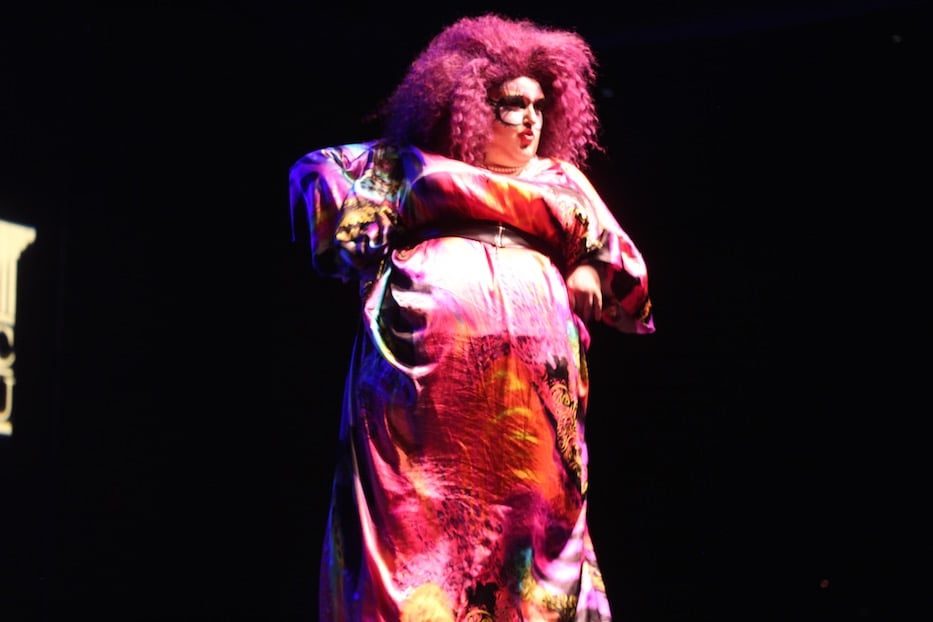
Queen Giganta Smalls performs during a Saturday afternoon drag show.
“We over the last three months have dedicated every second to the planning and creation of the LGBTQ+ Youth Conference,” Cajigas said in a phone call last Tuesday. “I'm just super thankful that the Pride Center was able to provide a space that is necessary and supportive for young people.”
Planning for the conference began earlier this year, with a series of listening sessions designed for young people. Of those who showed up, some had been to the True Colors Conference, but many had not. Over and over again, “we heard that Black and Brown queer youth didn't really feel like the space was a space for them,” Cajigas said.
“So we really focused on centering the voices of Black and Brown queer youth,” she continued. For the Pride Center, which launched its own Black and Brown Queer Camp five years ago this June, it was second nature. “It's the same as the organizing work we do. When you center those who are most oppressed among us, everyone is able to thrive.”
As attendees and volunteers arrived at the conference that Friday and Saturday, excitement buzzed through SCSU’s campus, making its way from workshops on queer liberation and tattoo artistry to youth-centered open mics held in the blazing sun outdoors. Middle and high schoolers walked across the quad and into the Lyman Center with rainbow and blue-and-pink trans pride flags pulled across their shoulders, flapping in the wind like bright superhero capes.
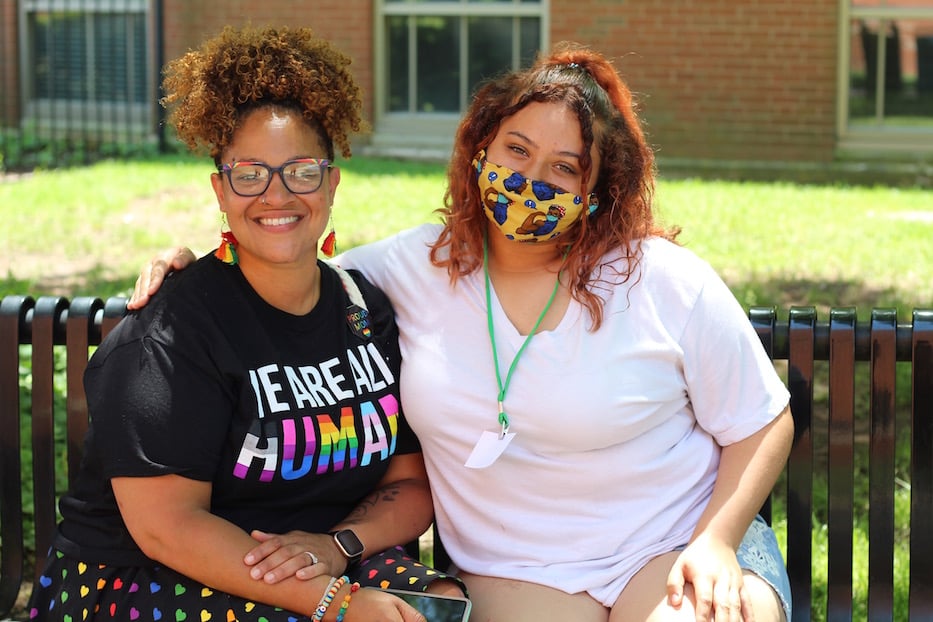
Marilyn Dunkley and Cilicia Rios. “Whenever I wear a rainbow, I feel happy inside,”Dunkley said.
Sitting outside on their lunch break Saturday, mom and daughter Marilyn Dunkley and Cilicia Rios said they came to celebrate and expand their LGBTQ+ community, which the two are constantly working to build from their home base in Middletown. An out and proud lesbian, Dunkley was excited to see the conference bounce back this year, when young queer people may need community more than ever.
In a report last year, The Trevor Project studied a rise in depression, anxiety, suicidality and self-harm linked to the Covid-19 pandemic. In addition, a record number of anti-LGBTQ+ and anti-trans bills have appeared in state legislatures across the country, threatening gender-affirming care and protections from New Hampshire to Missouri to Washington State. Connecticut is not exempt from discrimination: in March, a Hartford-based school nurse was placed on administrative leave after making anti-LGBTQ comments about a student on social media.
In her work as a chef at the Albert J. Solnit Children's Center, Dunkley has seen firsthand how important it is for young queer people and their allies to feel understood and respected, she said. She was thrilled when the Children's Center was able to send a small group of young people to the conference. Saturday, she arrived decked out in rainbow gear, from bright knitted earrings to a shirt emblazoned with the words We Are All Human in the stripes of asexual, bisexual, trans, gay, and pansexual pride flags.
“Whenever I wear a rainbow, I feel happy inside,” she said.
She added that the timing of the conference felt right: late May put her right on the cusp of Pride Month, and a season of celebration in Connecticut that stretches from June through late September. In Middletown, which she and Rios call home, that begins in June with the city’s now-annual PrideFest. As the sun soaked the quad at SCSU, she said she was looking forward to it.
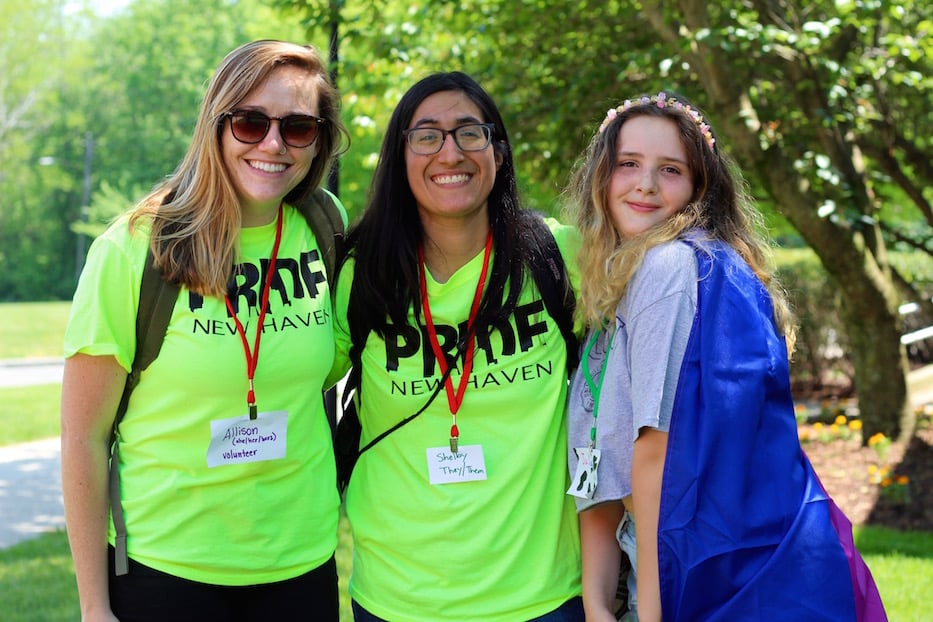
Allison Gauvin, Shelby Juarez, and Julia Gauvin.
As they walked towards the Lyman Center, newly minted friends Shelby Juarez and Allison Gauvin chatted, Gauvin’s daughter Julia walking just a few steps ahead of them in a flower crown and bisexual pride flag. Earlier that morning, Julia had attended a panel on queer feminisms, learning about the transformative work of Audre Lorde, Adrienne Maree Brown, Grace Lee Boggs and others. She’d been especially moved by Lorde’s maxim that “master's tools will never dismantle the master's house,” she said. As an eighth grader who is homeschooled, she was still chewing on it an hour after the panel had ended.
She wasn’t the only one enjoying the conference. Now an adult, Juarez remembered attending the True Colors conference in Storrs for the first time in 2009, when they were a senior in high school. Born and raised in Stamford, they didn’t grow up with a sense of queer community. The first time they walked into the conference, they experienced a kind of chosen family that they’d never had before. That bloomed into a multi-year relationship with True Colors, during which they came out to their family, and later returned to the conference as a volunteer.
“It changed my life,” they said. “It was the first time in my life that I was surrounded by queer people.”
For Gauvin, that sense of queer community also felt hard-fought—and was one of the things that brought her to the conference Saturday. Growing up in Plainfield, Conn., “My parents wanted me and my sisters to be ‘good’ kids,” she recalled. For them, that meant heterosexual. When she came out, “I was not accepted,” she said. Now, she doesn’t want her daughter to feel that same sense of self-censorship.
“It’s really hard to have queer community that isn’t at a bar or with alcohol,” Gauvin said. “I want people to see us during the day. I want us to be taking up space during the day.”
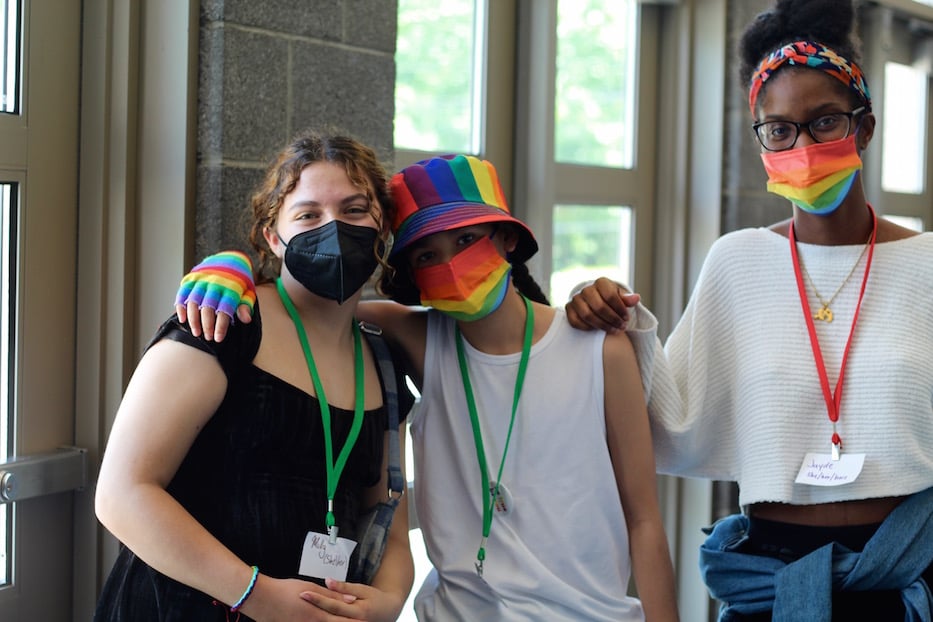
Molly Calderone, Julian Vazquez and "fun auntie" Jayde Holt.
Inside the building’s sun-dappled foyer, middle school students and friends Julian Vazquez and Molly Calderone bubbled with excitement, their words often spilling over each other in short bursts. Students at Hamden Middle School and Hopkins School respectively, both chose to attend the conference hearing about it through Jayde Holt, Julian’s nanny and self-described “fun auntie.” They had only been able to make Saturday’s slate of activities.
As he spoke, Julian posed in a rainbow bucket hat, rainbow-printed medical mask, and fingerless rainbow gloves. He said he was still thinking about the last workshop he’d attended, on tattoos and split shading basics. He’d been delighted to see that the presenter, the artist and maker Finn Lockwood, had purple and blue hair.
“This is fun for me,” he said. “This is just who I am. It makes me feel like nobody is gonna judge me.”
In the Lyman Center’s lobby, the auditorium’s doors swung open for an afternoon drag show. Julian and Molly hurried through the doors, hoping to find the right seat for their introduction to the art form. Holt, who was keeping an eye on both of them for the day, beamed as she followed them in.
“In This Fight You Are Not Alone”
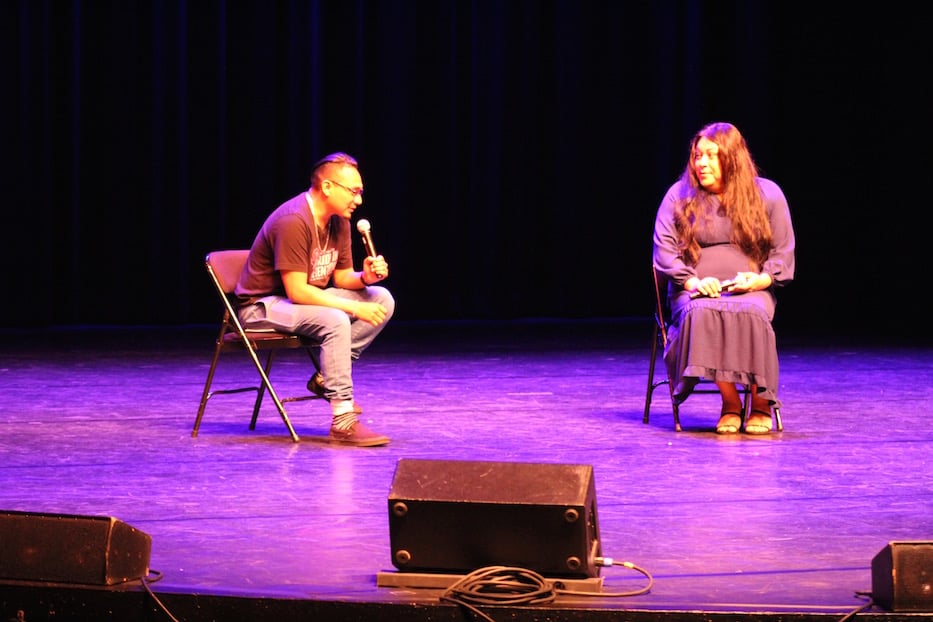 Nowhere, perhaps, was a propulsive sense of “Artivism” clearer than during afternoon drag performances and a series of keynote presentations spread over both days. On Saturday, the message rang through a discussion between Max Cisneros, LGBTQ Latinx program officer at the Pride Center, and trans rights trailblazer Jennicet Gutiérrez, a founding member of La Familia: Trans Queer Liberation Movement.
Nowhere, perhaps, was a propulsive sense of “Artivism” clearer than during afternoon drag performances and a series of keynote presentations spread over both days. On Saturday, the message rang through a discussion between Max Cisneros, LGBTQ Latinx program officer at the Pride Center, and trans rights trailblazer Jennicet Gutiérrez, a founding member of La Familia: Trans Queer Liberation Movement.
Cisneros, who attended the True Colors conference for the first time when he was 15, gave Gutiérrez a warm welcome.
“When I say brown, you say power!” he shouted into the mic. “Brown!”
“Power!” audience members screamed back through their masks.
Born and raised in Jalisco, Mexico in the 1980s, Gutiérrez now lives in Los Angeles, and does migrant justice work on both sides of the U.S.-Mexico border. As she came to the stage, she held her story in both hands, ready to share it with attendees as they fell to a hush.
Gutiérrez began by telling the audience that her mind had been unsettled thinking about the number of attacks on Black and trans people, particularly trans women, in state legislatures across the country. As an activist with lived experience, every anti-trans bill, every deadnaming, every refusal to provide gender-affirming services isn’t just exhausting for her on a policy level. It’s also deeply personal.
Growing up, Gutiérrez was often penalized and made to feel guilty when she expressed her feminine side, she said. At home, she was chastised for wearing dresses. In school, teachers reprimanded her for trying out the drums—ostensibly a girls’ instrument—instead of the trumpet. When she was just 11, her parents took her to a doctor “to fix me,” she recalled.
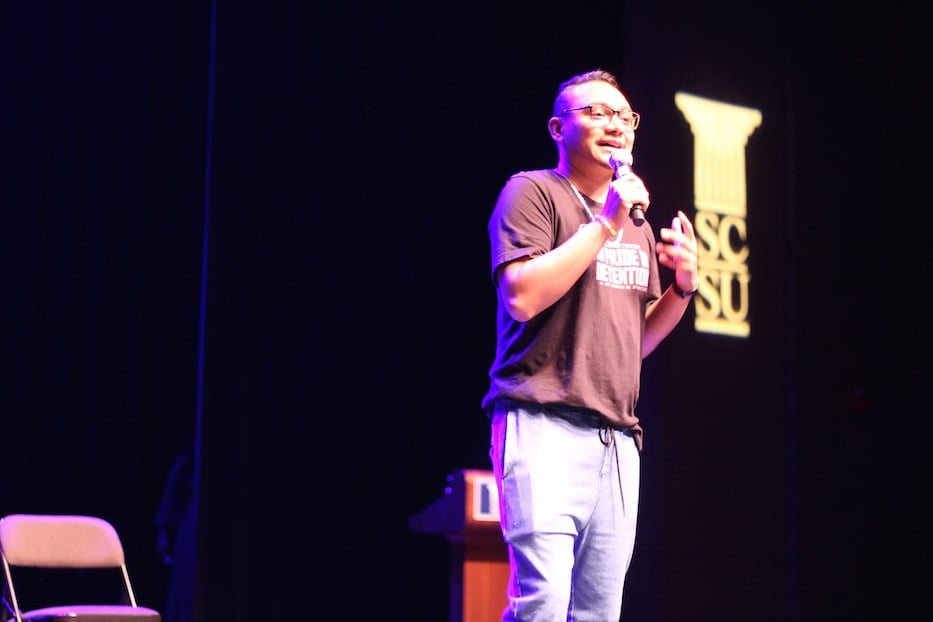
Max Cisneros, LGBTQ+ Latinx Program Officer at the New Haven Pride Center.
A listener could have heard a pin drop in the darkened auditorium as she spoke. For weeks, the doctor gave her pills meant to “correct” her behavior, she said. She remembered how bright they were, almost like small pieces of candy. And then after a month, he stopped.
“He told my family, ‘This is who she is,’” she recalled. “And fortunately, my family listened.”
Gutiérrez’ journey was just beginning. At 15 years old, she arrived in the U.S. as an undocumented immigrant, a status that she ultimately held for two decades (“imagine for 20 years having to fight for your dreams,” she said). It was during her time in the country that she began to think about who she was—and how she wanted to show up in the world. She was so tired of hiding, she said.
“There was a moment when I said to myself, ‘enough,’” she said. The audience burst into applause. “I cannot let Jennicet hold herself back.”
In 2013, Gutiérrez formally transitioned and began her involvement in advocacy work. From that moment almost a decade ago, she has become a fierce and tireless voice in the fight for trans rights in both the U.S. and Mexico. In 2014, she was a founding member of Familia with other LGBTQ+ immigrants. The organization centers people with lived experience, placing them in conversations around advocacy and policy that affect them directly.
With a hitch in her voice, Gutiérrez recalled meeting a elderly woman named Betsy in early May, on a site visit to “a very humble house” for trans women in Tijuana, Mexico. At 82, Betsy had gone to a shelter in search of a space to safely spend the night. Before she could enter, staff made her remove her wig, clothes, and makeup. They refused to use her name and pronouns. They were trying, Gutiérrez said, to break her.
“Transphobia is very deep. It’s very alive,” she said. “And in that entire time we were talking, Betsy’s humanity and dignity kept coming through her smile.”
As young attendees held on to every word, she urged them to jump into activism, no matter how small that first step or gesture might seem. She looked to the case of 17-year-old Leelah Alcorn, who took her own life in 2014 after her parents placed her in conversion therapy. There are so many people who need advocates, she said—and so many young voices that haven’t yet discovered their power.
“This Pride Month, I encourage you to celebrate yourself, but also get involved,” she said. “Get informed. Get involved. Any issue … there is a community for you and in this fight you are not alone.”
There will always be detractors, she added. In pushing back against them, she said, there is more collective power than attendees may recognize.
“Tell them, ‘You don’t need to fix me,’” she continued. “You need to fix society.”
Learn more about the New Haven Pride Center here.

